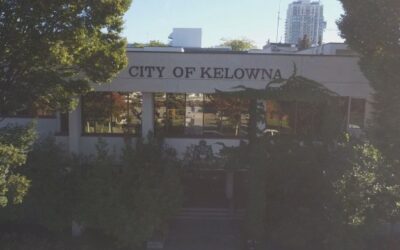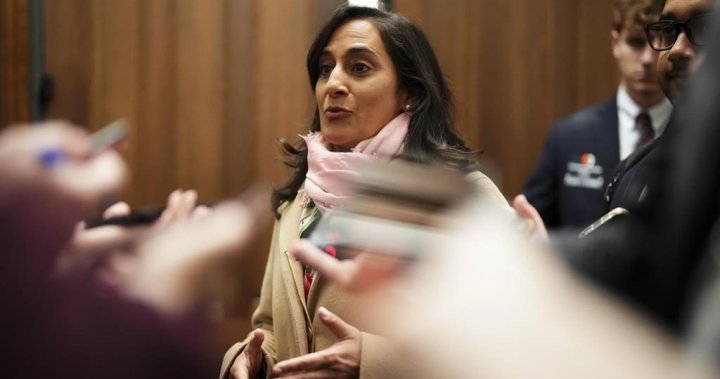Canadian government’s satellite deal prompts Conservatives to call for Elon Musk’s involvement – National

A $2.14-billion federal loan to an Ottawa-based satellite operator is sparking debate among Canadian politicians over whether U.S. billionaire Elon Musk poses a national security risk.
The fight is over internet connectivity in remote areas as Canada tries to deliver on its promise to connect every Canadian home to high-speed internet by 2030.
Telesat CEO Dan Goldberg said there appear to be “some misunderstandings” about the nature of the agreement between his company and the government.
A week ago, the Liberal government announced a loan to Telesat, which is launching a constellation of low-orbit satellites that will be able to connect the most remote regions of the country to broadband Internet.
Conservative MP Michael Barrett objected to the price, asking Musk in a social media post how much it would cost to provide his Starlink to every Canadian home without broadband access.
“Less than half that amount,” Musk replied, prompting Barrett to conclude: “That seems to me to be a common sense solution for Canada.”
In an interview, Goldberg rejected the comparison because his company received a loan, not a grant.
Telesat will pay the government a 9% interest. The Quebec government will also lend $400 million. In exchange, Telesat will give the two governments a stake of approximately 12% in the company.
“No one asked Elon, ‘Do you want a $2 billion loan from the Canadian government at 9% interest and give up 10% of Starlink?’” he said. “I think the answer would have been very different.”
He noted that part of the loan will eventually go to Elon Musk’s company SpaceX because Telesat uses the company to launch satellites.
A spokesperson for Innovation Canada said the new loan replaces a previous $1.44-billion loan announced in 2021 that was not delivered. The government is maintaining its commitment to spend $600 million to purchase internet capacity once the system is up and running.
The Liberal government has put in place a multi-year initiative to ensure that all Canadian households are connected to high-speed Internet, with a goal of reaching 98% by 2026 and 100% by 2030.
The latter communities are the most challenged because they rely on satellite service. Traditional satellite Internet, which uses a geostationary satellite higher in orbit, has its limitations.

Receive daily national news
Get the day’s top political, business and current affairs news delivered to your inbox once a day.
Next-generation low-Earth orbit satellite systems, like the one launched by Telesat and those used by Musk’s Starlink, use multiple satellites that orbit closer to Earth and can deliver high-speed internet without the same problems.
Telesat’s launch plans have already been delayed by several years. Goldberg said those delays, some related to COVID-19 challenges, are “ancient history” and the company plans to be fully operational with global coverage by the end of 2027.
Starlink’s coverage map shows the service is available in Canada, though its parent company did not respond to questions about the service’s availability in more remote areas of the country.
After Barrett’s exchange with Musk, Innovation Minister François-Philippe Champagne accused the Conservatives of wanting to “sell out our national security.”
“When you’re in the Far North, you need a reliable, sovereign and resilient network. So it seems a bit crazy to me to pretend otherwise.”
He said Telesat would design and manufacture the system in Canada.
“That’s the kind of sovereignty and resilience we want to see, especially when it comes to critical military infrastructure that we also need for the defense of the North.”
In a statement, the Conservatives stuck to their argument that Elon Musk would be a better choice. Industry critic Rick Perkins said that “there is an established and available platform that can provide high-speed internet access today, and it wouldn’t require billions of dollars of taxpayer money to be funneled into the pockets of Liberal insiders.”
The Conservatives also tried to link the contract to former Bank of Canada Governor Mark Carney, who was named the Liberals’ economic adviser on Sept. 9, four days before the Telesat loan was announced.
Conservative Party Deputy Leader Melissa Lantsman told the House this week that “Carney’s close friend, the CEO of Telesat, got over $2 billion of Canadian taxpayers’ money to build a broadband network that other companies could have built for half the price.”
Goldberg confirmed that Carney was a friend but said he “had absolutely nothing” to do with the loans.
In announcing the loan, the Prime Minister’s Office said Telesat would provide capabilities to the defense industry and support the modernization of NATO and Norad.
Goldberg said the deal did not contain details about the system’s use for defense purposes. He added that Telesat’s constellation could be a “key element” in Norad’s modernization.
In 2022, the Liberal government presented a $38.6 billion plan to modernize the joint Canada-U.S. aerospace warning system.
Elon Musk has become an increasingly controversial and political figure in recent years, particularly since he bought the social media platform Twitter, which he renamed X. He has used its vast reach to share false information.
Just last week, Musk shared a false report that explosives had been found near a Donald Trump rally; warned that “if Trump is not elected, America will fall under tyranny”; and questioned why no one was trying to assassinate President Joe Biden or Vice President Kamala Harris, following a failed assassination attempt on Trump.
Goldberg suggested there were good reasons to keep such a contract with a Canadian company.
“Space is a highly strategic, highly capital-intensive sector. If you look around, governments around the world are partnering with their national operators on a regular basis,” Goldberg said.
Erik Bohlin, chair of telecommunications economics, policy and regulation at the Ivey School of Business, noted that there have always been restrictions on foreign ownership in telecommunications, including in Canada, but that the satellite sector is “a new area where so much is happening.”
Adam Lajeunesse, an associate professor at St. Francis Xavier University who specializes in Arctic and maritime security, said the government has legitimate arguments when it comes to Arctic defence and national security.
He said there’s no reason to doubt Starlink can meet the needs of the Canadian Armed Forces today, but it’s important to consider what might happen to the company in a decade or two.
“Strategic communications are simply vital to all security and defence activities in the North, let alone civilian activities,” he said. “Having a single provider, particularly one that is outside the control of the government, is a dangerous situation.”
James Fergusson, a senior fellow at the University of Manitoba’s Centre for Defence and Security Studies, said Musk was “a Trump supporter” who has “said things that are in conflict with American foreign policy as it currently exists.”
But he pointed out that the U.S. Department of Defense uses SpaceX, Starlink’s parent company.
“For Americans, it does not represent a security problem.”



















